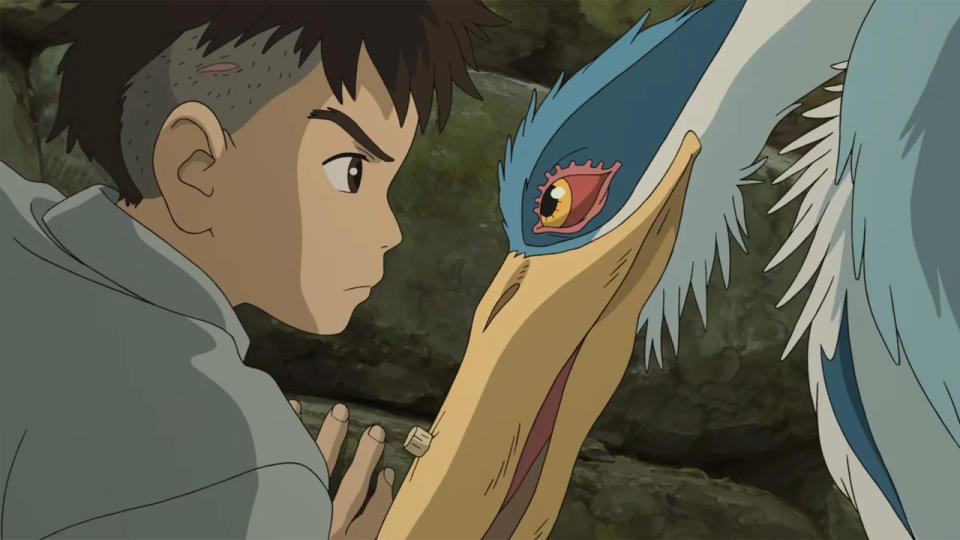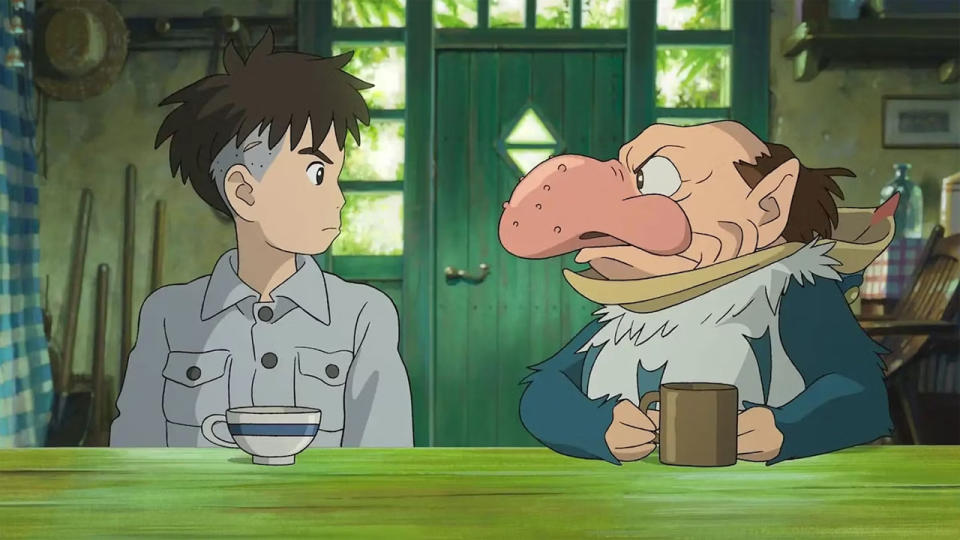I Finally Watched The Boy And The Heron, And I Love What The Studio Ghibli Film Says About Grief And Rebirth
When you buy through links on our articles, Future and its syndication partners may earn a commission.

Spoiler Warning: The following article contains major spoilers for The Boy and the Heron. If you have yet to watch the Studio Ghibli movie, please return after doing so.
Ever since I first heard about The Boy and the Heron a few years ago, I knew it was going to be an instant addition to the list of iconic Studio Ghibli movies. And while it came and went and became one of the best 2023 animated movies, for a variety of reasons I wasn’t able to watch the latest Hayao Miyazaki film on the big screen.
That all changed many months later when I was able to buy a copy of the Academy Award-winning animated feature film and finally check out what I assumed to be an emotional story about a young boy traveling to a fantastical world following the death of his mother. What followed was a transfixing and transformative experience with incredible animation, moving performances by its all-star cast, and a powerful story about loss, grief, and rebirth.
Some time has passed and thoughts have been collected, and I just have to talk about how The Boy and the Heron handled its major themes.

Like A Lot Of Hayao Miyazaki's Movies, The Boy And The Heron Uses Grief As A Motivation
A lot of the great movies by Japanese animator Hayao Miyazaki have tackled loss, death, and grief in some way, and The Boy and the Heron is no different. In fact, grief is not only at the core of the film, but it’s also the driving force and motivation of numerous characters’ actions throughout its narrative.
Before we know what is going on in the movie, we are like young Mahito Maki (Luca Padovan) being awoken to discover that the hospital where his mother is being treated has been bombed during World War II, killing her in a massive blaze. Though heartbreaking and earth-shattering, the death of his mother starts Mahito’s hero’s journey and becomes the catalyst for the major changes he goes through along the way. Sure, the grief is strong and blinding at the start, leading him to make unsettling yet understandable decisions, but it eventually leads to great things.

It's Both Heartbreaking And Endearing Watching Mahito Dealing With The Loss Of His Mother
Throughout the movie, it feels as if we are going along with Mahito throughout the various stages of grief as he tries to make sense of his mother’s death, come to terms with his father remarrying, and then later entering into a mysterious and fantastical world he visits alongside the Gray Heron (Robert Pattinson). The way in which Miyazaki is able to illustrate Mahito’s journey is nothing short of remarkable and the beloved filmmaker’s knack for crafting emotionally complex and rich stories is on full display here.
What’s so fascinating about Mahito’s journey, besides the wild and hard-to-explain creatures and locations he visits along the way, is the way in which his story is both heartbreaking and endearing. Sad, lost, and confused navigating a world in which his mother is no longer there, the young boy resorts to extreme acts of animosity, at one point bashing his own head with a rock after getting into a fight with another student. Even if you don’t fully understand his rationale at that moment, it’s impossible to not feel empathy for what he is going through.
Luckily, I never experienced the death of a parent as a child, but I imagine that this is what it might feel like.

Like Granduncle's Stack Of Blocks, The Boy And The Heron Is About Balancing Instability
One character from The Boy and the Heron that I’m still trying to wrap my head around is Granduncle (Mark Hamill), Mahito’s ancestor and the architect who both created the fantastical alternate reality and has spent years maintaining like some kind of balancing act. Throughout the movie, Granduncle is trying to find someone to take over and keep the fantasy world alive by balancing a stack of small stone blocks that will bring the realm crashing down if they tumble.
Though I still don’t fully understand the character and his story, I can’t help but think about how The Boy and the Heron is about balancing a world of instability and the great lengths someone will go to find that balance. Mahito struggles to find a way to counteract his grief, be it a distraction or a new course, and the Heron, later revealed to be Birdman, attempts to find balance in flight after being struck by Mahito’s arrow. And I’m sure there are countless other examples that will be revealed with further viewings.

Mahito Maki's Transformation From A Scared Boy Full Of Animosity To One Willing To Accept Fate Is Profound
As mentioned above, Mahito goes through an incredible transformation by the time The Boy and the Heron wraps up, and the young, scared boy full of animosity and malice from the start of his journey is replaced with someone willing to accept both his fate and that of his late mother. One scene I love in particular comes when Mahito refuses Granduncle’s offer to build a better version of the fantastical world with a new set of blocks, acknowledging his own malice by showing the self-inflicted wound from earlier in the movie.
Mahito basically goes through the five stages of grief, with the various encounters and events from the fantastical world standing in for each of those different stages. He comes out of it profoundly changed by the experience, which is something critics loved before the film’s release.

Himi's Decision To Go Back To Her Time, Knowing Her Fate, Is Incredibly Powerful
Throughout The Boy and the Heron, Mahito travels through the dreamlike world with Himi (Karen Fukuhara), who is later revealed to be his mother. Before they depart and Mahito goes back to his world, he warns his mother that she will one day die in the hospital bombing seen in the opening scene. Despite knowing when and how she will die, Himi still goes back to her previous life without a moment’s hesitation.
This incredibly powerful moment, which I was able to experience with my daughter like so many other Studio Ghibli films, was made all the more emotional because Himi was willing to go about life knowing that she would suffer an agonizing death because one day she would get to bring Mahito into this world.
All in all, The Boy and the Heron was an incredible and transfixing experience, one that will stick with me for quite some time. And while I’m not sure when we’ll get another Studio Ghibli film, there are some upcoming 2024 movies that will hold me over while I wait.
